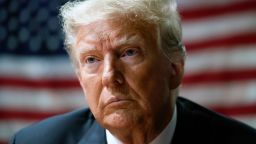Editor’s Note: Norman Eisen served as counsel to House Democrats in the first Trump impeachment and as White House ethics czar and ambassador to the Czech Republic in the Obama administration. The views expressed in this commentary are his own. View more opinion on CNN.
When I was serving as then-President Barack Obama’s special counsel for ethics and government reform, I helped write Executive Order (EO) 13526, which reformed the classification system for national security documents. The executive order brought needed clarity by articulating more uniform rules for classification and declassification in place of what had, over many years, grown into a tangled mess.

When former President Donald Trump took office in 2017, he left the rules in place. That will surely come back to haunt him in the classified documents probe. Indeed, special counsel Jack Smith repeatedly cited this executive order in the recently unsealed federal indictment, which implicates both Trump and his aide Walt Nauta, who has been charged as a co-conspirator.
Smith has indicted Trump on 31 counts under the Espionage Act, 18 USC § 793(e), as well as six additional counts related to obstruction and his alleged attempt to conceal his retention of classified documents. Trump denies any wrongdoing, and Nauta’s attorney declined to comment on Friday.
To convict Trump under the Espionage Act provision, prosecutors will have to prove a series of elements, including that Trump had “unauthorized possession” of one or more documents (or information) relating to national defense and “willfully retain[ed]” them, failing to deliver them “to the officer and employee of the United States entitled to receive” them.
A great deal, potentially including Trump’s freedom, will turn on the word “unauthorized,” since there can be no doubt that Trump was in possession of such documents, and willfully retained and refused to deliver them to the government.
According to the indictment, when Trump left office, he took dozens of documents from the White House and brought them to Mar-a-Lago. The National Archives repeatedly asked for their return. Trump refused to comply, eventually prompting escalation by the Department of Justice, which executed a subpoena. Though some documents were recovered following the subpoena, a judge subsequently authorized a search warrant — allowing the FBI to recover over 100 additional classified ones.
Throughout that time and since, Trump has loudly defended his actions, including at the CNN town hall last month and on Truth Social both before and after his announcement of the charges. Clearly seeing Espionage Act charges coming — they were among the charges for which a judge found probable cause to authorize that search warrant — Trump has been steadfast that his retention of the documents was authorized.
“They’re mine,” he reportedly declared, his advisors said, when they pressed him to send the classified materials to the National Archives, offering an ever-shifting set of reasons why. First, and most famously, Trump argued that he can automatically declassify documents — and did so with the documents at Mar-a-Lago. He also said that as president, “even by thinking about it,” he could render a document and the information in it declassified.
The problem for Trump is that EO 13526 is central to knocking down every variation of his defense that his retention of the documents was somehow authorized. It sets up a declassification process that applies to everyone — even the president — and it says nothing about automatic presidential declassification.
According to the indictment, Trump acknowledged in one recorded conversation that the classification rules apply to him and that he was aware of and followed them while in office (including the ones I helped write). Indeed, in the quoted conversation, Trump showed a classified document to others after his presidency and admitted that it was still classified, and he no longer had the power to declassify it. No wonder Trump and his allies may be willing to make this automatic declassification argument on cable television, but he and his lawyers have so far not been ready to advance it in court filings or arguments, where they would face penalties for false statements.
Trump’s claims that the Presidential Records Act (PRA) justifies his behavior doesn’t pass muster because that statute doesn’t actually have anything to do with the critical question of whether his possession of these documents was authorized — the executive order covers that. Yet Trump and his legal team claim that the PRA applies, arguing that the PRA, which provides in general terms for the handling of government documents by ex-presidents, allows Trump to decide unilaterally if any document is personal, and thus legally hold onto it.
But the statute nowhere stretches the definition of personal documents to encompass our nation’s most sensitive secrets. On the contrary, personal documents are defined as “purely private” ones which “do not relate to or have an effect upon the carrying out of the … duties of the President.”
Trump’s position ignores that, trying to dodge the actual law that applies — the executive order. Even though Obama was no longer in office when Trump allegedly took documents to Mar-a-Lago, his executive order was and is still in effect, and nothing in the PRA contradicts it.
Thus, the handling of any classified document, no matter its status under the PRA, is also subject to the limits of the executive order — which Trump did not appear to follow, according to the indictment.
Get Our Free Weekly Newsletter
- Sign up for CNN Opinion’s newsletter
- Join us on Twitter and Facebook
Trump has also defended himself by proclaiming that federal investigators have mistreated him. He’s pointed out that President Joe Biden and former Vice President Mike Pence, who both had classified documents in their possession after their service, weren’t subject to a search warrant or the kind of deep investigation that has followed. Trump’s argument here could take the form of a selective prosecution defense — the idea that prosecutors are abusing their power by unfairly targeting him for political reasons, but that is a sure loser in court.
It should also fail in the court of public opinion, and once again, the executive order is part of the reason why. Evaluating Trump’s pattern of statements and actions against the backdrop of the executive order and the rest of the applicable law, it’s clear that he is in defiance of the legal system. That offers a dramatic contrast to the cooperation of both Pence and Biden who, if they did not comply with the executive order and other laws, are at least trying to make it right. Pence said “mistakes were made” and accepted full responsibility, and a Biden spokesperson said “the President’s personal attorneys have cooperated with the Archives and the Department of Justice.”
Neither case features any publicly available evidence of the kind of willful retention that Trump allegedly exhibited. There is little wonder the Pence investigation was recently closed; and while the investigation into Biden remains ongoing, there are thus far no signs that charges will follow. That message needs to be hammered home in public discourse, and the executive order provides a key foundation for that information.
In each of his defenses, Trump is running up against the core American idea that no one, not even an ex-president, is above the law. The classification system and the declassification rules represented by our executive order are a central part of the legal limits that apply here — making this indictment the greatest legal danger yet for the former president. It is one that he could have perhaps avoided if he had studied the order a little more closely — and followed it.




